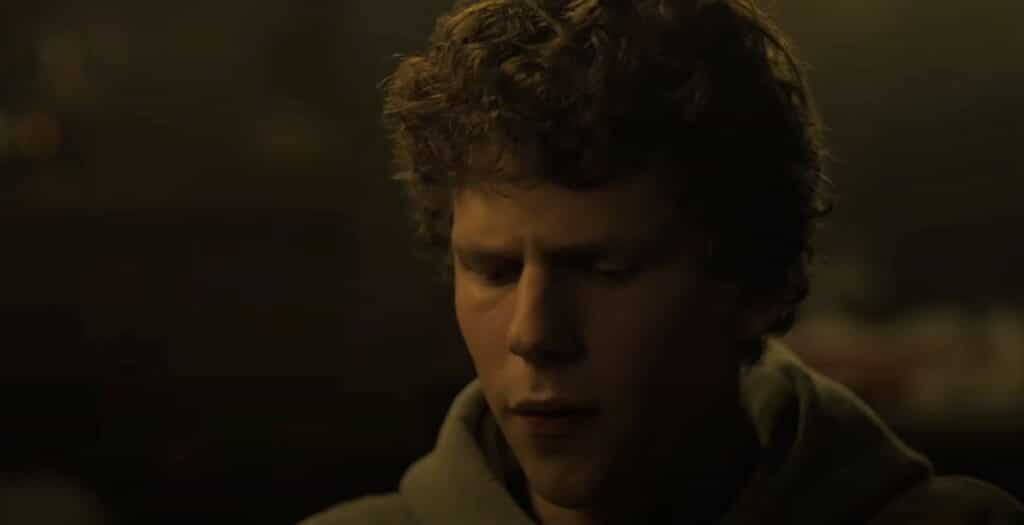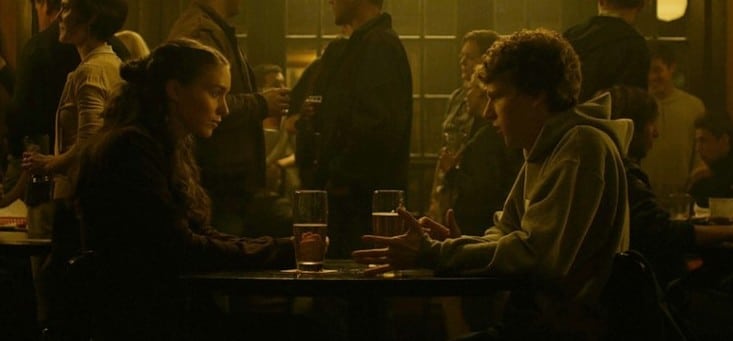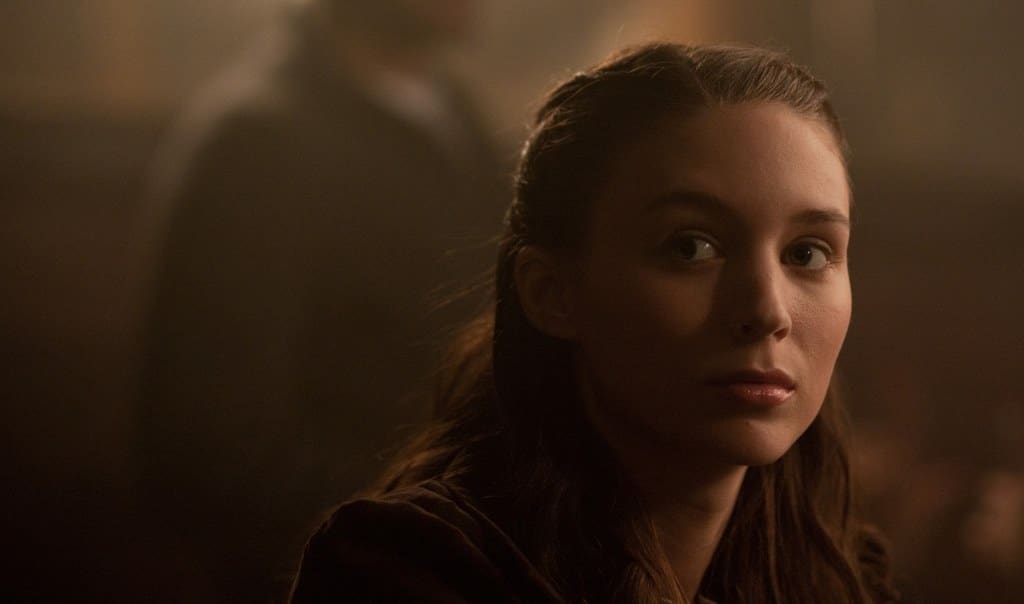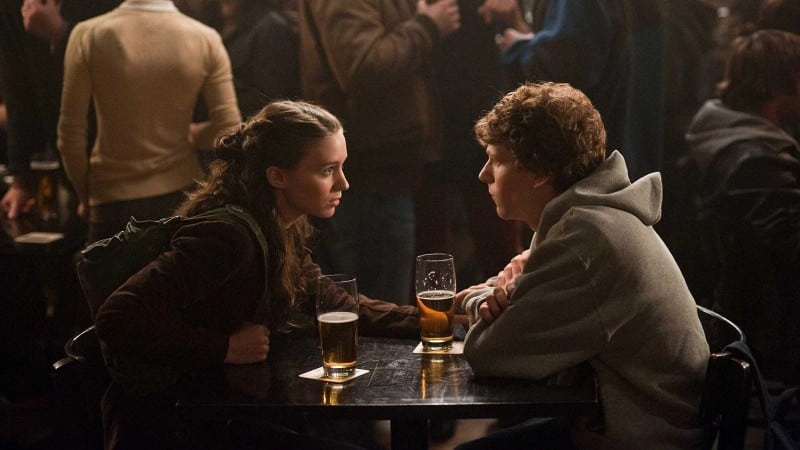The Social Network opening scene grips the audience into its world. It’s one of the most compelling examples of an opening scene in its use of quick dialogue, acute character set-up and rich conflict.
Written by the characteristically sharp Aaron Sorkin, The Social Network, as a whole, is a masterful exploration of clashing egos. It’s ultimately a brilliant character study, taking a look at what drives someone with ruthless ambition. And it’s the opening scene that lays this thematic purpose down brilliantly, starting the film off as it means to go on.
So what does The Social Network opening scene teach about writing a great opening scene? What can screenwriters glean from this brilliant set-up? We take a look.
Table of Contents
Opening Shots – Starting Strong
The scene is relatively long (running at just over 5 minutes and around 9 pages) and has many ebbs and flows to it, changing in direction, tone and intention. But to start with, the scene lays down a clear marker of the film’s overall theme with its, and Mark’s, first line…
Did you know there are more people with genius IQ’s living in China than there are people of any kind living in the United States?
The theme of competition is immediately apparent, as is the theme of being at the top of the pile. Part of Mark’s next lines further accentuates this…
How do you distinguish yourself in a population of people who all got 1600 on their SAT’s?
Immediately, the audience’s attention is brought to the idea of standing out amidst a fiercely competitive environment. Welcome to the world of Harvard. Here, everyone is top of their class. So how do you stand out? This is Mark’s preoccupation and one that will define his character arc within the film. Immediately, the scene plunges us into the concerns of this world and of the protagonist at the heart of it.
Mark, however, has a pretty good answer for how to distinguish himself, or at least he thinks so…
Or I can get into a final club.
This will become a topic of conversation for the next few lines. Mark seemingly thinks this is his way into Harvard’s elite. Again, this exchange demonstrates the social hierarchy present at Harvard, thrusting the audience into this competitive and hierarchical world.
The conversation up to this point has been relatively jovial and pithy. But the conversation about final clubs quickly leads into the first point of conflict, and something deeply revealing about Mark’s debilitating ego.

Fragile Ego – Characterisation
Mark’s characterisation is acutely rendered throughout the script. And it takes barely a minute to assert itself on the action in The Social Network opening scene. It comes via Erica’s genuine inquisition about his attempt to get into a final club…
ERICA: Okay, well, which is the easiest to get into?
Mark is visibly hit by that…
MARK: Why would you ask me that?
Mark assumes Erica means the easiest one to get into is the only one he stands a chance of getting into. From this moment, their conversation takes a turn. At the start, it’s hard to imagine that the scene will end with a breakup. But this moment is a key turning point in reaching such a conclusion.
It’s a brilliant example of how to shift the atmosphere in a scene. The direction (“Mark is visibly hit by that…”) allows for a beat and for Mark’s physical demeanour to change before that’s reflected in the dialogue. This beat is essential in bridging the gap between a relatively breezy exchange to an altogether more spiky one.
Mark won’t let this perceived slight go and it will spiral into an argument that leads Erica to break up with Mark. However, it’s clear this doesn’t just come out of nowhere. Mark’s comment seems to prick something in Erica too; a sense that she constantly has to battle with him.
ERICA: Mark, I’m not speaking in code.
This first hint of conflict is crucial in foreshadowing the conflict that will define the film. Mark is driven by a fierce sense of competition, inferiority and ego. These qualities make it hard for him to get through a conversation with his girlfriend. So, clearly, they will have wider implications for how he moves through this world. Conflict is, therefore, tantalisingly sown here.
The Motivation – Protagonist Goal and Story World
One of the brilliant things about The Social Network opening scene is the way that, upon reflection, it sets up everything about Mark’s motivation moving forward. This is what a truly great opening scene does – essentially boils the entire premise down into one scene.
MARK: I’m saying I need to do something substantial in order to get the attention of the clubs.
ERICA: Why?
MARK: Because they’re exclusive. And fun and they lead to a better life.
Whilst Mark’s motivation in the film isn’t just to get into a club specifically, the above line says everything about Mark’s desire for status. “I need to do something substantial…”, “Because they’re exclusive“. Words couched in these lines of dialogue do a great deal of foreshadowing about what is to come.
- Mark feels he needs to do something notable to get attention within a hyper-competitive atmosphere. This turns into establishing Facebook, on his own, away from the clutches of the Winklevoss twins.
- Moreover, the exclusivity is a key part of what will make Facebook so special in the first place, essential to its conception and USP.
In The Social Network opening scene, dialogue isn’t necessarily literal in how it foreshadows the plot. But it subtly sneaks in words and ideas that are essential to the why and how of the forthcoming narrative. This is important not because it cleverly hints at the story, but because it’s a key way of establishing tone.
Right from the start, ideas about status, competition, hierarchy and exclusivity are baked in. These ideas help establish this story world so that everything going forward will make sense in that context. Just as in a sci-fi story, where setting up the rules of the world is crucial for the audience’s suspension of disbelief, so it is here too.

Dialogue and Tone – Style
Not only is The Social Network opening scene’s tone instructive about the story world but also about the film’s style and pace. Anyone who is familiar with Aaron Sorkin‘s trademark style won’t find the fast-paced dialogue a surprise. But for those who aren’t familiar, the opening scene provides a perfect acclimatisation period.
- The dialogue is quick, exchanged as a battle between the two characters. And this sets up the film’s upcoming tone brilliantly.
- After all, it’s not just the opening scene that is written in this style, the entire film is made up of fast-paced dialogue scenes where characters seemingly act as sparring partners, even if they’re on the same side.
The opening scene then is vital in establishing the film’s tone, idiosyncratic as it is. It’s a settling-in period for the audience, a chance for them to adapt to the film’s rhythm. How does Sorkin achieve this? Well, fundamentally, whilst the style is unique and the dialogue rapid-fire, the scene is still essentially conveying the most important things it can; character and story. Both these elements are remarkably clear in the opening scene.
So the style never feels like the overriding message of this opening scene. Instead, it’s just a distinctive vessel for the story. This is a fantastic lesson in substance over style, particularly when it comes to dialogue.
Lots of writers will try to ape Sorkin’s patter, both via the witty barbs and the pace. The ones that will more successfully do so will be serving the story and characters at hand. Whereas, the unsuccessful ones will make style the only purpose, resulting in a scene that perhaps initially seems dynamic but is truly just hollow.
Erica – The Anti Mark

Crucial to balancing The Social Network opening scene is Erica, Mark’s soon-to-be ex. In so many ways, she’s the anti-Mark. And her presence is vital in highlighting Mark’s characteristics and showing that another point of view exists.
She does this throughout the scene in subtle ways, through the things she says. Most of the time, however, Mark overrides what she is trying to say and dominates the direction of the conversation.
ERICA: There are really more people in China with genius IQ’s than the entire population of —
MARK: The Phoenix is the most diverse. The Fly club, Roosevelt punched the Porc.
This, in and of itself highlights the patriarchal world we’re about to enter, a world in which the egos of men frequently override their female counterparts. Mark often isn’t really interested in what Erica is saying. And this means, for instance, that he misses the clues that she is about to break up with him. It seems to come as a surprise to him. But for how long has she been sowing these seeds? Her weary sighs are ample evidence, evidence that he misses.
Moreover, it’s clear that Mark has an attuned ear for things that he’s interested in (particularly and mostly when they’re about him) but seems to ignore things that don’t interest him. Erica indulges him in these instances. But they wear on her, clearly.
ERICA: Although just because something’s trite it doesn’t make it any less —
MARK: I want to try to be straightforward with you and tell you that I think you might want to be a little more supportive.
Erica clearly has different aspirations than Mark. Most obviously, she doesn’t share his obsession with status. And in being an antagonist to Mark in this way, she provides a perfect balance.
A Fuse is Lit
One of the best things about The Social Network opening scene is the way in which it kickstarts the story with a clear, emotional motivation for the protagonist. It gives the audience a point of reference to follow.
This opening scene can act like a constant reminder for the audience, an anchor that helps navigate the story. The narrative is built upon this opening scene’s ground and, in particular, the devastating message that Erica gives Mark as she leaves…
ERICA: You are probably going to be a very successful computer person. But you’re going to go through life thinking that girls don’t like you because you’re a nerd. And I want you to know, from the bottom of my heart, that that won’t be true. It’ll be because you’re an asshole.
The scene sets up Mark as an “asshole” in pretty clear terms. But more importantly, it sets up the idea Mark might have of himself. Mark doesn’t think he’s a bad guy, just a nerd, someone who can’t “row crew” but who can, instead, prove himself via his intellect.
Erica penetrates this image and it’s something that strikes at Mark’s core. She tells him that his behaviour can’t be justified and that whatever view of himself he might have, he is essentially just an “asshole”. This hits home for Mark. Not only is he upset that Erica has dumped him. But he’s upset clearly because she has seen straight through his exterior shelf and punctured his ego.
Perhaps the clearest indication, however, that this scene is a “rosebud” moment for Mark is the fact that Sorkin highlights in his description that “a fuse has just been lit”. This line acts as a full stop for the scene but a prelude for the rest of the movie.
Based on True Events
Sorkin encourages us to believe that the rest of the story wouldn’t have happened if it weren’t for this break-up scene on a random Tuesday night in 2003. In real life, this scene likely never happened.
However, in a way, this highlights the power of the opening scene more than anything else. It shows how in a screenplay a tangible motivation for the protagonist is vital in allowing the audience to understand where they’re coming from and what’s driving them.
The Social Network opening scene is Mark’s origin story. If he’s the superhero or villain (we’ll leave that one open to debate) this is the moment his powers gain purpose. Moreover, it’s the moment that will lurk in the back of his mind whatever he achieves. We see this play out in the movie, with Mark searching for Erica on Facebook in the closing scene.
In reality, Mark Zuckerberg has disputed the idea that a break-up had anything to do with the founding of Facebook. But he, perhaps unsurprisingly, misses the point that fiction can sometimes reach a more inherent truth than strict facts. Sorkin tries to get to the human element that drives such an incredible story.
In this context, the opening scene brilliantly portrays an otherwise impenetrable character as vulnerable and unguarded, revealing their insecurities and flaws. In trying to make up for these foibles, the protagonist and the story finds its drive. Ultimately, there’s little better purpose for an opening scene to have.
–What did you think of this article? Share It, Like It, give it a rating, and let us know your thoughts in the comments box further down…
– Struggling with a script or book? Story analysis is what we do, all day, every day… check out our range of script coverage services for writers & filmmakers.
Get *ALL* our FREE Resources
Tackle the trickiest areas of screenwriting with our exclusive eBooks. Get all our FREE resources when you join 60,000 filmmakers on our mailing list!


Fantastic, thank you! Spectacular scene, and breakdown.